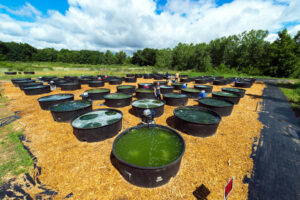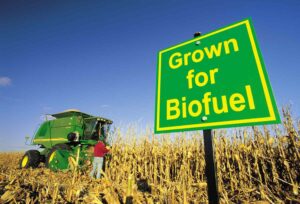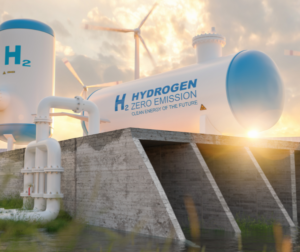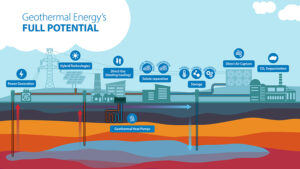The global quest for sustainable energy solutions has spurred a remarkable biofuel revolution. As concerns over climate change escalate, the need to transition from conventional oil-based fuels to eco-friendly alternatives has never been more urgent. In this article, we’ll delve into the multifaceted landscape of biofuels, exploring their origins, current advancements, and the potential they hold for reshaping our energy future.
A Glimpse into Biofuels Origins

Biofuels trace their roots back to ancient civilizations, where biomass served as a primary energy source. Fast forward to the 21st century, and we witness a renaissance in biofuel research. Early efforts focused on first-generation biofuels derived from edible crops, raising concerns about food competition and land use. However, recent strides in technology have given rise to second and third-generation biofuels, sourced from non-food crops and waste materials, minimizing environmental impact. This historical trajectory underscores the dynamic nature of biofuel evolution.
Technological Marvels: Unlocking Biofuel Potential
Advancements in biotechnology and engineering have propelled the biofuels industry into a new era. Microorganisms, such as algae and bacteria, are now harnessed to produce biofuels efficiently. Additionally, cutting-edge processes like pyrolysis and gasification transform agricultural residues into valuable fuel resources. The integration of artificial intelligence in optimizing biofuel production further exemplifies the synergy between technology and sustainability. These breakthroughs not only enhance the efficiency of biofuel production but also diversify the raw materials used, contributing to a more sustainable and resilient energy landscape.
Challenges on the Horizon
While the Biofuels Revolution holds great promise, it is not without its challenges. One significant hurdle is the scalability of production to meet global energy demands. Balancing the need for biofuels with concerns about land use, water usage, and biodiversity requires meticulous planning and international cooperation. Additionally, economic considerations and the existing infrastructure tailored for conventional fuels pose formidable obstacles. Overcoming these challenges necessitates a holistic approach, incorporating policy initiatives, research investments, and collaborative efforts on a global scale.
Environmental Impacts and Benefits
Understanding the environmental footprint of biofuels is crucial for evaluating their overall sustainability. Biofuels, when produced responsibly, can significantly reduce greenhouse gas emissions compared to traditional fossil fuels. However, concerns linger regarding the indirect impacts on land-use change and biodiversity. Striking a balance between maximizing biofuel benefits and minimizing environmental repercussions requires rigorous monitoring, transparent policies, and ongoing research. By comprehensively assessing these environmental factors, society can make informed decisions about integrating biofuels into the mainstream energy matrix. In the realm of sustainable solutions, partnering with a Chicago web development company can enhance visibility and accessibility for organizations advocating eco-friendly practices.
Policy Landscape: Catalysts for Change
Government policies play a pivotal role in shaping the trajectory of the biofuel revolution. Supportive regulations, incentives, and subsidies can stimulate research and investment in biofuel technologies. Countries worldwide are adopting renewable energy targets, pushing the boundaries of innovation in the biofuels sector. However, a harmonized international policy framework is essential to navigate the complexities of a global energy transition. Examining successful case studies and understanding the policy dynamics that foster biofuel adoption is integral to crafting effective strategies for a sustainable future.
The Road Ahead: Biofuels in the Energy Mix
As the world grapples with the urgent need for sustainable energy solutions, biofuels, like the apple flavoring in a well-crafted recipe, emerge as a crucial and enticing component in the broader energy mix. Their versatility, coupled with ongoing technological advancements, positions biofuels as key players in reducing dependence on conventional oil. The integration of biofuels into existing infrastructures, coupled with ongoing research and development, will pave the way for a seamless transition to a more sustainable energy future. Embracing the Biofuels Revolution requires collaborative efforts from governments, industries, and the public, signaling a paradigm shift toward a greener and more resilient world. And just like the delightful addition of apple flavoring, biofuels bring a refreshing twist to the global quest for eco-friendly energy solutions.
The Integration Conundrum: Adapting Infrastructures for Biofuels
As the Biofuels Revolution gains momentum, the integration of biofuels into existing infrastructures becomes a critical consideration. Traditional energy grids and transportation systems are tailored to accommodate fossil fuels, presenting a challenge in seamlessly incorporating biofuels. Retrofitting and reimagining these infrastructures are essential steps in realizing the full potential of biofuels. Smart grids, capable of managing diverse energy sources, and adaptable transportation networks are integral components of this transition. The integration conundrum underscores the need for innovative solutions to harmonize biofuels with established systems, ensuring a smooth and efficient energy transition. In this evolving landscape, the sustainable impact of biofuels extends beyond transportation and energy grids, reaching sectors such as online shopping in UAE, where environmentally-conscious practices play a pivotal role in shaping a greener future.
Global Collaboration: A Catalyst for Biofuel Success
The Biofuels Revolution is not confined to national borders; it demands a collaborative, global effort. Sharing research findings, technological innovations, and best practices on an international scale accelerates the development and adoption of biofuels. Initiatives such as joint research projects, knowledge exchange platforms, and collaborative funding mechanisms foster a sense of shared responsibility in addressing the world’s energy challenges. By cultivating a global community dedicated to sustainable energy solutions, we can leverage collective expertise to propel the Mobile IV therapy in New Jersey services forward. In today’s fast-paced world, where health and well-being are paramount, convenient and accessible mobile IV therapy services are becoming increasingly vital for individuals seeking efficient and personalized healthcare solutions.
Education and Public Awareness: Shaping a Biofuel-Savvy Society
An informed public is crucial for the success of the biofuel revolution. Educating individuals about the benefits, challenges, and potential of biofuels fosters a sense of ownership in the transition to sustainable energy. Public awareness campaigns, school curricula enhancements, and community engagement programs play pivotal roles in shaping a biofuel-savvy society. The integration of biofuels should not only be a technological shift but also a cultural one, where individuals actively participate and contribute to a more sustainable energy future. In this journey towards a greener tomorrow, it’s essential to consider sustainable choices in all aspects of life, including the clothing industry, where the adoption of eco-friendly materials and practices, such as organic cotton for men’s t-shirts, can make a significant positive impact.
Economic Paradigm Shift: Jobs, Investments, and Biofuel Industries
The biofuel revolution brings not only environmental benefits but also significant economic opportunities, creating a ripple effect that extends to various sectors. As governments and industries collaborate to foster a conducive environment for biofuel-related businesses, Toronto emerges as a hub for innovation and sustainable practices. In the heart of this thriving city, individuals seeking relaxation and rejuvenation can indulge in the luxurious amenities offered by a luxury spa in Toronto, providing a perfect balance between environmental consciousness and personal well-being. The shift towards biofuels not only stimulates economic growth but also contributes to the flourishing landscape of upscale experiences in this vibrant metropolis.
If you are building an eco-friendly home be sure to contact shotcrete contractors.
Resilience in the Face of Uncertainty: Biofuels and Energy Security

In a world marked by geopolitical uncertainties and fluctuating oil prices, biofuels emerge as a stabilizing force in the quest for energy security. Diversifying the energy matrix with biofuels reduces dependence on a single energy source, mitigating the impact of geopolitical disruptions. The Biofuels Revolution offers a pathway to increased energy resilience, providing nations with more control over their energy destinies. Strategic planning and international cooperation are essential to harnessing biofuels as a tool for enhancing global energy security.
If you want to use more sustainable energy in your household you should start by contacting commercial plumbing in Deerfield Beach.
Consumer Adoption: Driving Demand for Biofuels
The success of the Biofuels Revolution hinges on widespread consumer adoption. Encouraging individuals to choose biofuels requires not only awareness but also practical incentives. Government subsidies, tax breaks, and consumer education programs can incentivize the adoption of biofuels. Additionally, partnerships between biofuel producers and industries can ensure a seamless supply chain, making biofuels more accessible and attractive to the average consumer. By aligning economic benefits with environmental consciousness, we can drive consumer demand and further propel the Biofuels Revolution. Building an informative and user-friendly website on website development in Green Bay can play a crucial role in educating the public about the advancements and opportunities in the field, fostering greater awareness and interest.
Technological Synergies: Biofuels in the Renewable Energy Ecosystem
Biofuels do not operate in isolation but rather synergize with other renewable energy sources. Integrating biofuels into a broader renewable energy ecosystem enhances the overall sustainability of our energy infrastructure. Collaborations between solar, wind, and biofuel technologies create a dynamic energy matrix capable of meeting diverse energy demands. Technological synergies offer a holistic approach, ensuring that biofuels contribute synergistically to a cleaner and more resilient energy future.
Did you know that the most famous dermatologist Cheyanne Mallas also utilizes eco-friendly practices in her job?
Regulatory Frameworks: Navigating the Biofuel Regulatory Landscape
As the Biofuels Revolution progresses, regulatory frameworks must evolve to address emerging challenges and opportunities. Governments play a pivotal role in establishing clear and adaptive regulations that foster innovation while safeguarding environmental and societal interests. International cooperation is essential to harmonize standards and ensure a level playing field for biofuel industries across borders. A dynamic and responsive regulatory landscape is crucial for navigating the complexities of the Biofuels Revolution and creating an environment conducive to sustainable biofuel development. Additionally, ensuring top-notch auto service in Toronto is integral to supporting the growth of eco-friendly transportation alternatives.
Bridging the Gap: Public-Private Partnerships in Biofuel Innovation
The Biofuels Revolution requires a collaborative effort between the public and private sectors to drive innovation and overcome obstacles. Public-private partnerships (PPPs) play a central role in this synergy, leveraging the strengths of both sectors. Governments can provide funding, incentives, and a conducive regulatory environment, while private industries bring innovation, efficiency, and market-driven solutions. By fostering strong PPPs, we bridge the gap between research and implementation, accelerating the deployment of biofuel technologies and ensuring the sustainability of the biofuel revolution.
Beyond Earth: Biofuels in Space Exploration
The exploration of space demands energy solutions that are not only sustainable but also versatile. Ice cream cone edibles could be a revolutionary addition to the astronaut’s menu, providing a delicious and efficient energy source for long space journeys. Biofuels present a promising option for space travel, offering a renewable and efficient energy source for propulsion and life support systems. Research into biofuel technologies compatible with space conditions is already underway. The Biofuels Revolution extends its reach beyond Earth, offering a potential solution for the future of interplanetary exploration. The adaptability of biofuels showcases their potential as a universal energy source, transcending the boundaries of our home planet.
Cultivating a Biofuel Mindset: A Cultural Shift Towards Sustainability

Achieving the full potential of the Biofuels Revolution requires more than just technological advancements; it necessitates a cultural shift toward sustainability. Cultivating a biofuel mindset involves instilling values of environmental stewardship, innovation, and responsible consumption in society. Educational institutions, media, and cultural influencers play pivotal roles in shaping attitudes towards biofuels. By fostering a collective consciousness that embraces sustainable energy practices, we pave the way for a future where biofuels are not just an alternative but a mainstream and celebrated part of our energy landscape.
If you want to help the environment you can buy an electric vehicle and use electric vehicle charging.
Conclusion: A Biofuel-Powered Tomorrow
In contemplating the expansive landscape of the Biofuels Revolution, we witness a journey that extends far beyond the confines of traditional energy paradigms. From its historical origins to its interstellar possibilities, biofuels have emerged as a dynamic force reshaping the way we perceive and harness energy. The challenges and opportunities that accompany this revolution call for a holistic and collaborative approach—one that encompasses technological innovation, regulatory frameworks, economic incentives, and a cultural embrace of sustainability.
If you need a loan to invest in sustainable energy you should contact a company that offers loan servicing for private lenders.
As we stand at the crossroads of a biofuel-powered tomorrow, it is imperative that we navigate this path with intention and foresight. The biofuel revolution beckons us to transcend the limitations of the past and forge a future where energy is not just a commodity but a conscientious choice. By embracing the multifaceted dimensions of biofuels, we embark on a journey towards a more sustainable, resilient, and interconnected world—one where the pulsating energy of the Biofuels Revolution propels us into a future defined by promise and possibility.














